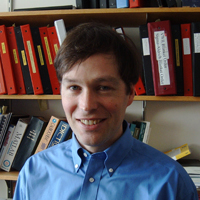Spotlight on Faculty: Dr. Joseph Zaia
 Among the many great researchers at BUSM, Dr. Joseph Zaia, Associate Professor in the Department of Biochemistry, is here to offer some insight on the trials and rewards of being an advisor, educator, and scientist in the modern world.
Among the many great researchers at BUSM, Dr. Joseph Zaia, Associate Professor in the Department of Biochemistry, is here to offer some insight on the trials and rewards of being an advisor, educator, and scientist in the modern world.
Q. What is the best part of being a professor and scientist at BUSM?
As for being a scientist, I enjoy having a unique and universal language, the language of science. It transcends individuals and native languages. I can talk to anyone in this language with this background. It doesn’t matter where in the world someone is from, we can talk about science.
The best part of being a professor at BUSM is the opportunity to teach. Being a mentor to developing scientists is extremely satisfying. Students are so important to the life of the Biochemistry Department. I encounter so many excellent students here. They are focused, hardworking, up to date on the literature, and have a necessary spark for working in the lab.
BUSM provides a sense of community within the field and in the laboratory. This school has a special feel to it, especially within the basic sciences. People here are open to collaboration and are so easy to approach with an idea, or are willing to offer assistance. I don’t have the same academic background as the rest of my colleagues, but I fit in here. There is a synergy within this academic and research community.
Q. What is being an advisor to these students like?
Students first do four rotations in different labs before they decide where they prefer to work. Deciding to do thesis research in a professor’s lab is a mutual agreement entered into by the student and the professor, and specifically mediated by the Student Affairs Committee in my department, Biochemistry. As students become more experienced and comfortable in the lab, they gain more autonomy. It takes years to develop the intuition and understanding needed to plan and execute projects that are successful. I like to have at least one face-to-face sit down with each student in my lab every week as well as weekly group meetings. It can take some time building up momentum as an advisor. The first five years I advised were completely different from now. I make better decisions now as how to advise people. I’ve learned it’s important to encourage people, and I’ve learned how to encourage them in the right way. An advisor must figure out each individual’s needs.
Q. What advice would you give to those deciding on their lab placements?
- The personality of the lab mentor is very important. You need to enjoy working together. The chemistry has to be there. You need to feel it can work, and if not, consider other options.
Q. It seems you’ve grown professionally while here at BUSM, what advice would you give to young faculty members?
- Get advice from your colleagues.
- Get others to help you avoid the mistakes that everybody makes.
Q. Can you tell us a little bit about your role as the Associate Director for the Center for Biomedical Mass Spectrometry?
The purpose at the Center is to combine basic technology development to meet the emerging needs of biomedicine. It is essential to glue these two aspects together. I am looking at the biochemistry of connective tissue, which relates to many different disease processes. As part of the lab, I get the opportunity to talk with a lot of people here at BUMC, as well as elsewhere. The work is important to help develop disease therapies, and therefore, feels extremely meaningful. Our work involves development of technology, or more specifically, mass spectrometry, which can be applied to compound classes, such as proteoglycans that are a part of every tissue. This technology is universal and has many applications, from studying cell growth in cancer to Alzheimer’s disease.
Q. How did you become interested in Mass Spectrometry?
I was originally trained as a chemist and I joined a biotech company to study cartilage joint repair. I focused the biochemistry of cartilage, which led to my interest in the chemistry of connective tissue, and I have been working on the clinical application of these methods. My career path has been growing towards the exploitation of proteoglycan biochemistry toward the development of therapeutic targets.
Q. You’ve been a part of the BU community for over ten years. What is it that has kept you here?
BU provides an excellent environment for students, especially in the biochemistry department. The people in charge of the program really care about the students and are experienced enough to deal with any problems in a very reasonable way. It’s not the type of environment where a student can get lost in the shuffle because there is someone who will check on their progress. The right students are admitted into the program, and they are all very capable.
Q. Any other advice for young scientists?
- Think about the scientific problem you what to solve. Force yourself to think about what society needs done. There should be something more specific than just ‘I want to do science’.
- It’s not easy to do be a scientist, and the scientific questions may not be clear to you in your 20’s. So try to figure out what problems are the most important to solve in your career as a scientist. Pay attention!
By:
Margaret Wentworth